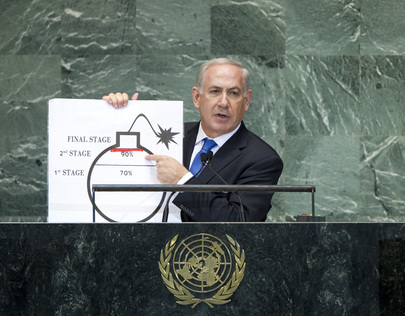Benjamin Netanyahu at the UN General Assembly
Joining the International Criminal Court (ICC) remains one of few options for the "State of Palestine," but it's one with profound implications for Zionism and Hamas. The latest Gaza conflict has highlighted potential violations of international humanitarian law pursuant to the Rome Statue cited by the UN High Commissioner for Human Rights, the UN Secretary General, Amnesty International, Human Rights Watch, and others. However, the inconsistency with legality may be more fundamental, originating in action and application of ideology predating the recent Gaza conflict. The opposition in Israel and Washington to Palestine becoming a full UN member is in most significant part concern about the consequences of the newly recognized state becoming party to the ICC. However, the implications are also demanding of Palestinians, particularly that segment of the leadership espousing Hamas' political platform.
Zionism, or Zionism Excluding the Rights of Others?
What's at issue is not Zionism and the "right of return" but the degree to which such is applied in violation of the rights of others. Confiscation of lands of Palestinian Christians and Muslims based upon largely ethnic/religious identity could be judged as violation of UN human rights conventions as well as a crime pursuant to the Rome Statute. The charges of Israel's disproportionate use of force and inadequate regard to civilian casualties may also be the subject of future inquiry, but the standing occupation and its relationship to the rights of the occupied Palestinians is the most serious vulnerability. (The question of Israel's Arab citizens is distinct and less problematic, but such citizenship will not be extended to all Palestinians if Israel desires to be a "Jewish state." Similar considerations would apply to states that characterize themselves as "Islamic," "Christian," "Buddhist," "Hindu" or atheist, as has been evidenced by recent history.)
Opening the Door to the ICC?
What would give the Palestinian Authority standing with the ICC to initiate investigation and potential prosecution? The West Bank is considered not only "occupied" but, with Gaza, part of a Palestinian state that can become party to the ICC. (In 2013 the Palestinian Authority formally renamed itself the "State of Palestine.") Until Palestine joins the ICC, such potential prosecution would not be possible without a UN Security Council referral, which Washington would almost certainly veto.
The UN General Assembly (UNGA) has, in the past, voted that Zionism is akin to apartheid. However, the vote was largely a political action without legal consequence for Israel's military and political leadership. Furthermore, such a UNGA Resolution hasbeen voided by subsequent votes. However, action before the ICC would have far more profound implications for Israel's soldiers and leaders acting within Palestine. They could be investigated and prosecuted for direct actions, command and control, and/or failure to take actions to restrain and/or prosecute violations within domestic courts. The recent Gaza conflict could be only an element of a possible ICC inquiry, but most critically the Netanyahu government as a whole could be held accountable. Most profoundly, the ideology of Zionism as applied by Israel's leadership could be characterized as an ideology giving rise to discrimination and abuses inconsistent with relevant UN conventions and the Rome Statute.
"Two-State" Solution?
The "two-state" solution has been broadly endorsed by UN member states, including the U.S. It has, at least in principle, also been accepted by Palestine and Israel, but the commitment of the Netanyahu government has been put into question. As an American and a Bosnian, I have a fundamental difference with ideologies that define citizenship rights on the basis of ethnicity or religion. Nonetheless, if this is the desired outcome by the parties directly involved, then it may be the best option. The persecution of Jews, and the Holocaust particularly, executed on the soil of a presumably democratic and pluralistic Europe, have given rise to a new vision of Jewish statehood. However, some within Israel's current leadership/government seek to deflect the two-state solution, and their intentions and vague alternatives would be less questionable if Israel's government did not continue demolition of Palestinian homes and farms to expand "settlements." Collective punishment of Palestinians only furthers the notion that they would continue to be seen and addressed as third-class citizens within a greater Israel.
Hamas Failure to Recognize Israel's Right to Exist?
Whatever one's views on Zionism and the foundation of Israel, the legality of the state is not in question, as it is a UN member in addition to being broadly recognized by other states. Calls for the eradication of Israel would come under similar scrutiny as a Zionism applied to the exclusion of the rights of others. Palestinians may refrain from diplomatic recognition of the state (as is the case in other intercountry disputes), but questioning a UN member state's right to exist could bring into question the culpability of the Hamas leadership. Furthermore, the tactics employed by Hamas in the current Gaza conflict do demand accountability. Hamas' political platform could also be seen as problematic for the nonreligious and non-Muslims in any future inclusive Palestinian state.
ICC as Bargaining Chip in Peace Talks and/or Tempering Factor in Conflict?
Israel has the overwhelming balance of power militarily, economically, and through the reality of indefinite occupation, and thus in any peace negotiations. The Intifadas as well as the recent surge of the brand of Hamas resistance reflect this sense of imbalance and hopelessness. The application of Palestine to the ICC is feared by Israel's leadership and, by extension, Washington, perhaps not only for the risk of prosecution but also because it may tilt negotiating leverage slightly back toward the Palestinians. Appearing impotent in the face of Israel's onslaught as well as Hamas' military option, the mainstream, more moderate Palestine leadership may regain credibility with an increasingly traumatized and frustrated population by pursuing the ICC option. However, perhaps all moderates, or, more accurately, those espousing the rule of law in Palestine, Israel, and beyond, would gain in standing among the populations of the two states. Potential conflict would be tempered, and those promoting a fair and lasting negotiated resolution would be more empowered.
Bosnia, Israel and Palestine: A Linked History
David "Dado" Elazar pictured with Israeli Prime Minister Golda Meir
Muslims and Jews from Bosnia and Herzegovina (BiH) and southeast Europe also settled in greater Palestine starting largely during the 19th century, as the Ottoman Empire was shrinking in Europe. The last of the indigenous Jews of the Holy Land was exterminated during the Crusades, and the Ottoman Empire facilitated the first "return" after several centuries of absence. Among today's Israeli population are some Bosniaks (Bosnian Muslims) who came as "righteous gentiles" or were welcomed as refugees during the 1990s genocide in BiH. General David Elazar was born to a Jewish family in Sarajevo -- frequently referred to as the European Jerusalem due to its long interfaith tradition. He rose to the top ranks of the Israel Defense Forces in the 1960s and '70s. I have also minimized using the term "Jew" in relating it to Zionism. Some of the most adamant Zionists are not Jewish, and some of its most vociferous critics are Jews. Furthermore, Zionism has come to have several interpretations, some which may be consistent with the rights of non-Jews, and others not (see "The Decadence of Persecuting Deviance").
Preventing Future Conflict?
The security of Israel, Palestine, and all regional neighbors would be enhanced if the rule of law were evidenced to at least gain a foothold in the resolution and preservation of any negotiated settlement. Undoubtedly there are some who want a selective peace, one that gives legitimacy to all their claims and ideology/theology. The notion of "God-given rights," particularly at the expense of the other, have fueled extremists of all ilks as well as anti-Semitism. This is now contaminating the region from Syria to Iraq and beyond via new avenues of radicalism, intolerance, and potential terror based on presumably theological/ideological absolutism (see "Who Will Get Sold Out at Syria Peace Talks?").
A Tribunal Shaped by the Rule of Law
The ICC has been shaped by states and particularly jurists who have evidenced traditions for the respect of the rule of law and those aspiring to such. The court is dominated not by "Third World states" but, to the contrary, by more developed democracies. Around two thirds of the UN's member states have joined the ICC. Those who are holdouts convene a peculiar club, including China, Russia, Iran, India, Pakistan, the U.S. and Israel, each perhaps holding itself beyond if not above the equal application of the law.
The means as well as the motives of the recent Gaza conflict have been rationalized by each side, more by rhetoric and public relations. Hamas and the Netanyahu government appeared less than willing to embrace a ceasefire when the plight of civilians should have been the primary concern. War crimes and grave violations of international humanitarian law were probably committed, but there is a need to ask why extremism has come to dominate and war projected as the only resolution of a cruel, zero-sum politics. The Netanyahu government and Hamas leaderships have been adamant: "Our way or no way." They reject the ICC perhaps out of fear of personal culpability, but also because it may bring scrutiny to an irreconcilable claim whose motive may be as much to perpetuate a standoff where perhaps conflict is not merely a symptom but a tool.


